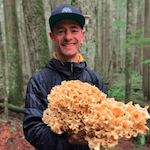by Skye Chilton, Mushroom Enthusiast & Expert

As medicinal mushrooms become increasingly popular among the mainstream for their myriad health benefits, supplement companies are jumping on the bandwagon to include them in their products. As it turns out, many supplements in the U.S. market that tout the benefits of their mushroom ingredients don’t actually contain any mushrooms at all!
Rather, they consist primarily of mycelium, the mushroom’s root system, and the rice or grain on which it is grown. This is ground into a powder and included in the whole mix, instead of the actual mushroom (fruiting body). Studies conclude that, absent the fruiting body or the ‘real mushroom’, the health benefits are severely diminished, and may be nothing more than inactive grain powder that the body cannot utilize. This is because the highest concentration of beta-glucans and other therapeutic compounds are primarily found in the mushroom.
When searching for a high quality mushroom product, look for the following:
- Made from organic mushrooms (fruit bodies)
- Extracted to increase bioavailability
- Verified levels of beta-glucans on the label
- Guarded against fillers like grain
Now, let’s take a look at some of the most popular medicinal mushrooms and their benefits!
Lion’s Mane
Lion’s Mane mushrooms (Hericium erinaceus) is rich in a multitude of important compounds: beta-glucans, which are responsible for many benefits but are primarily known for immune system modulation. More recently, certain compounds of interest like hericenones and erinacines have shown potential for neuroprotection by stimulating production of nerve growth factor (NGF) [1]. Small scale clinical trials with elderly patients have shown improvements in depression, anxiety and cognitive decline [2,3].
Reishi
Reishi mushrooms (Ganoderma lucidum) contain high amounts of beta-glucans which are associated with immune regulation, and if taken over time can significantly support the immune system through its effect on white blood cells. It also contains beneficial triterpenes which gives reishi its bitter flavor. As an adaptogen, it is also known to improve sleep, reduce stress and fatigue [4].
Cordyceps
Cordyceps (Cordyceps militaris) are an incredible immune boosting mushroom because of their ability to increase the number of NK (natural killer) cells. They are also thought to enhance physical performance due to the presence of adenosine and cordycepin which can help increase the body’s natural production of ATP, which delivers energy to our cells [5,6].
Chaga
Chaga (Inonotus obliquus), which is commonly referred to as a mushroom, is actually a woody canker that grows in the colder regions of the Northern Hemisphere. As Chaga grows primarily on birch trees, many of the medicinal compounds like betulin and betulinic acid come from the birch tree itself. The outer black layer on the canker contains high amounts of melanin which can be beneficial for our skin [7].
Turkey Tail
Turkey Tail mushroom (Trametes Versicolor) is one of the most well researched medicinal mushrooms. It grows on dead logs worldwide, and receives its name because its rings of brown and tan look like the tail feathers of a turkey. Turkey tail contains one of the highest amounts of beta-glucans for all mushrooms and two immunotherapy drugs in Asia, PSP and PSK, have been derived from it [8].
Shiitake
Shiitake mushrooms are the most popular mushrooms in the world, have a meaty, versatile flavor, and a long history of use. During the Ming Dynasty in China, shiitake was deemed “the elixir of life”. They’re great to cook with, and are also loaded with B-vitamins, helping to control blood sugar levels and reduce inflammation in the body [9].
Maitake
Maitake (Grifola frondosa) is commonly known as Hen of the Woods or the Dancing Mushroom. It is plentiful in the deciduous forests of North America and Japan. An edible mushroom with an earthy flavour, Traditional Chinese Medicine has used this mushroom for its support on the immune system. This mushroom contains polysaccharides such as beta-glucans, which have been linked to healthy cell growth and turnover [10].
Vitamin D
Mushrooms can also be a great source of Vitamin D. Contrary to what many articles might say, your typical store bought mushrooms do not contain a high amount of Vitamin D but they do contain a fungal sterol called ergosterol. When ergosterol is exposed to UV light, it is converted into ergocalciferol (Vitamin D2). Simply slicing your store bought mushrooms and putting them out in the sun for 20 minutes can drastically increase the amount of Vitamin D content. Through more technical UV light processing the Vitamin D content can be brought up to as high as 40,000 IU per gram. While Vitamin D3 is typically prescribed, daily supplementation with Vitamin D2 has been shown to be as effective as Vitamin D3 in raising serum levels [11,12].
About Skye Chilton, Founder of Real Mushrooms
He describes them as “magical, out of this world, cancer busting, immune boosting, and brain balancing…” we’re talking about mushrooms! Skye Chilton has been around mushrooms his entire life. His father, Jeff Chilton, was an instrumental figure in the creation of the now booming medicinal mushroom product category. And Skye’s now carrying the torch at Real Mushrooms. Skye knows what to look for in a mushroom-based product, why mushrooms from China sometimes get a bad rap, and even has a favorite mushroom.
References:
- https://pubmed.ncbi.nlm.nih.gov/18758067/
- https://pubmed.ncbi.nlm.nih.gov/20834180/
- https://pubmed.ncbi.nlm.nih.gov/18844328/
- http://www.medicinacomplementar.com.br/biblioteca/pdfs/Fitoterapia/fi-0405.pdf
- https://pubmed.ncbi.nlm.nih.gov/27408987/
- https://pubmed.ncbi.nlm.nih.gov/28094746/
- https://link.springer.com/article/10.1007/s11094-006-0194-4
- https://pubmed.ncbi.nlm.nih.gov/22185453/
- https://pubmed.ncbi.nlm.nih.gov/31030752/
- https://pubmed.ncbi.nlm.nih.gov/29872510/
- https://pubmed.ncbi.nlm.nih.gov/18089691/
- https://pubmed.ncbi.nlm.nih.gov/20427729/



